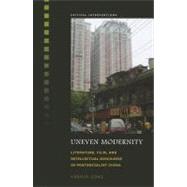
Note: Supplemental materials are not guaranteed with Rental or Used book purchases.
Purchase Benefits
What is included with this book?
| Acknowledgments | p. vii |
| Introduction: China, Uneven Development, and Global Modernity | p. 1 |
| Uneven Modernity in Postsocialist China: A Critical Inquiry | p. 11 |
| Popularization of Traditional Culture in Postsocialist China: A Study of the Yu Qiuyu Phenomenon | p. 32 |
| Constructing a Neorealist Reality: Petty Urbanites, Mundaneness, and Chi Li's Fiction | p. 57 |
| Commerce and the Critical Edge: The Politics of Postsocialist Film and the Case of Feng Xiaogang | p. 85 |
| Geopolitics in Postsocialist Art Film and Beyond: Reading Wang Xiaoshuai's Films | p. 108 |
| Postscript: Is an "Even Modernity" Possible in China? | p. 133 |
| Notes | p. 139 |
| Index | p. 187 |
| Table of Contents provided by Ingram. All Rights Reserved. |
The New copy of this book will include any supplemental materials advertised. Please check the title of the book to determine if it should include any access cards, study guides, lab manuals, CDs, etc.
The Used, Rental and eBook copies of this book are not guaranteed to include any supplemental materials. Typically, only the book itself is included. This is true even if the title states it includes any access cards, study guides, lab manuals, CDs, etc.